Are you someone who is always looking for ways to stand out at work and go above and beyond in your role?
We all know that going the extra mile can really make a difference and show our dedication to our job and team. But sometimes, it can be tough to find the right words to describe this extra effort. That's why we are here!
From "going beyond the call of duty" to "exceeding expectations," these phrases can help you better express the hard work and dedication you bring to your job.
Keep reading to learn more and discover how you can really make a splash in your career by going above and beyond!
You can download our e-book by clicking the cover image.
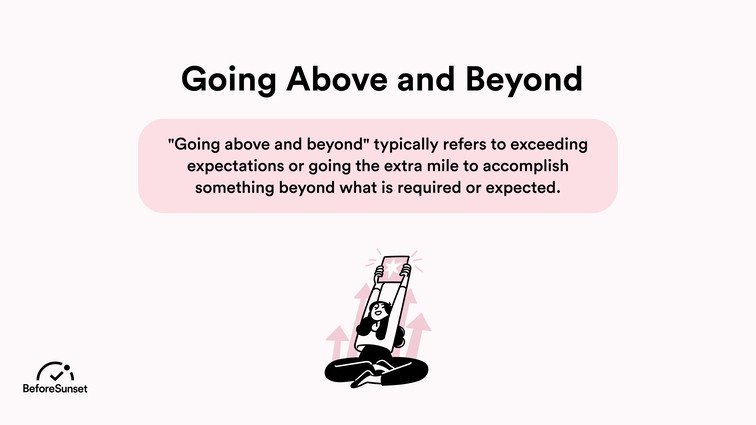
How Do You Describe an Employee Who Goes Above and Beyond?
Going above and above in one's profession shows a remarkable level of commitment to one's job. They take the initiative to develop novel and practical solutions because they are proactive in spotting roadblocks and chances for advancement.
They routinely do their task on time and at a high standard, which establishes their dependability and reliability. They appreciate working with others and lending a hand when needed. They are also strong team players. This type of employee is generally positive, conscientious, and ambitious. the necessary decision to be taken.
Why Do People Go Above and Beyond?
People may go above and above for different reasons.
Some people could be driven by a desire for professional achievement as well as for personal fulfillment. They take delight in carrying out their duties to the best of their abilities and work to produce outstanding outcomes.
Others could be inspired by the possibility of professional recognition and success, knowing that their actions could make them stand out in their company and open doors to prospects for growth and promotion. Also, some workers may go above and beyond in order to obtain praise from their coworkers or superiors and be recognized for their dedication.
Last but not least, going above and beyond displays someone's worth and devotion to the company, which may help people keep their jobs.
Ultimately, the motivations for going above and beyond might vary, but they frequently result in growth on the personal and professional levels and can be advantageous to the business as a whole.
What Is A Good Example Of Going Above and Beyond?
When a worker steps up to address an issue that goes beyond their normal responsibilities, it's a great example of going above and beyond in the workplace. Consider a marketing coordinator assigned to an event planning assignment who, seeing a possible problem with the venue's logistics, calls the venue in advance, offers alternatives, and arranges the required changes without waiting for higher-up permission.
This shows a strong sense of accountability as well as a dedication to making sure the project is successful. Anticipating requirements, accepting responsibility for difficulties, and demonstrating a sincere commitment to the team's objectives are all examples of going above and beyond, all of which eventually contribute to a productive and upbeat work atmosphere.
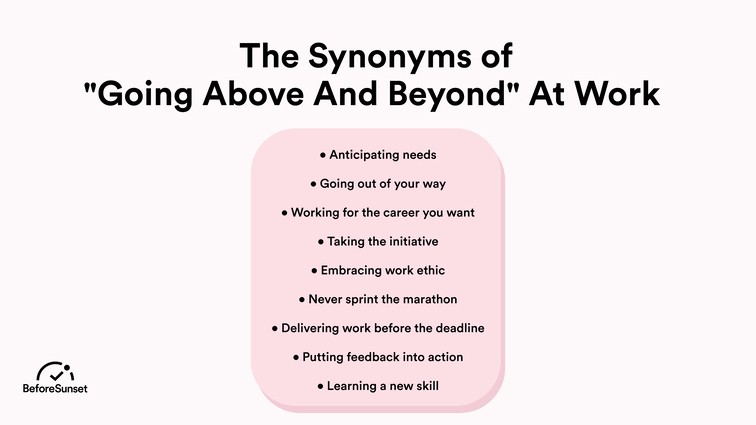
The Synonyms of "Going Above And Beyond At Work”
1. Anticipating Needs
One way to go the extra mile is by anticipating the needs of your colleagues and team. But what does it mean to anticipate needs in the workplace, and how can you do it effectively?
Anticipating needs in the workplace means being proactive and thinking ahead to identify potential problems or needs before they arise.
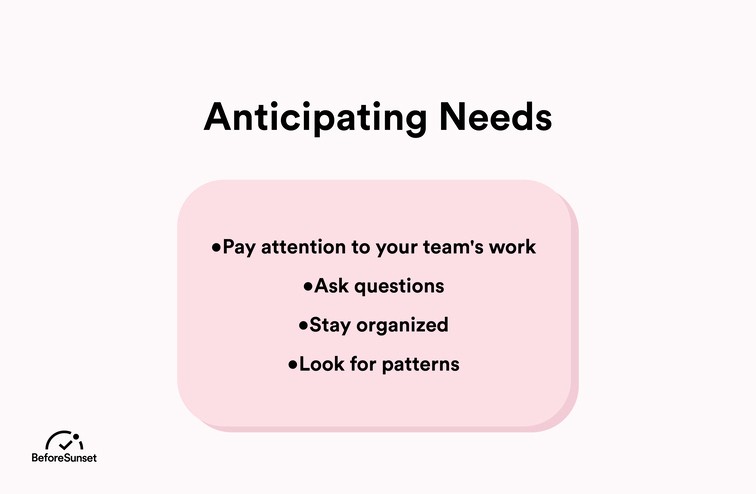
It could be as simple as noticing that a colleague is running low on supplies and restocking their supplies before they have a chance to run out. Or, it could be anticipating a potential problem in a project and finding a solution before it becomes an issue.
Anticipating potential problems and taking preventative measures is a key leadership trait.
If you're wondering how to anticipate the needs of your team and colleagues, here's how!:
Pay attention to your team's work:
By staying attuned to what your team is working on, you can better anticipate their needs and find ways to support them.
Ask questions:
Don't be afraid to ask your colleagues and team members what they need. By staying in communication and keeping an open dialogue, you can better understand their needs and find ways to help.
Stay organized:
By staying organized and on top of your own work, you can more easily identify potential needs and find ways to support your team.
Look for patterns:
By looking for patterns and trends in your team's work, you can better anticipate their needs and find ways to support them.
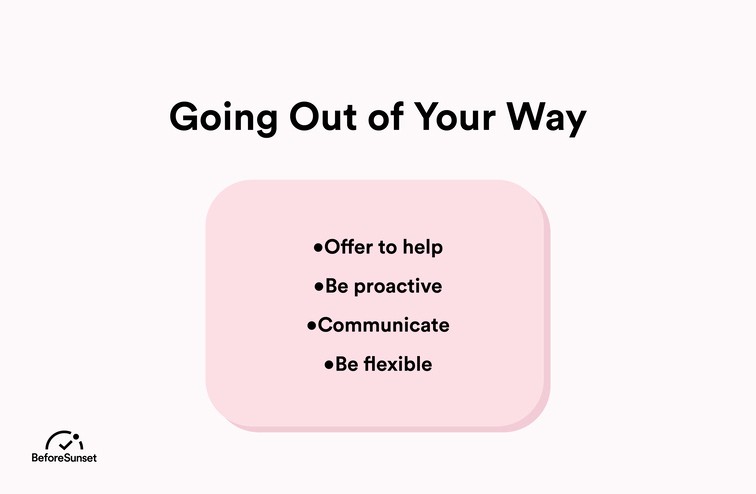
2. Going Out of Your Way
Going out of your way is rare these days, and not everyone or employers value it. You need to show that you're willing to work hard. Whether you are a freelancer or a part of a team, going above and beyond matters.
By going out of your way to help your colleagues and team, you demonstrate a willingness to support others and a strong sense of teamwork. It shows that you are willing to put in extra effort and go above and beyond to make a positive contribution to your team and organization.
Here are some tips if you want to go out of your way to help your team, employees, clients, and colleagues:
Offer to help:
Don't be afraid to offer your assistance to your colleagues and team members. Even if it's not part of your job duties, they may appreciate the extra support.
Be proactive:
Look for ways to proactively help your team and colleagues, rather than waiting for someone to ask for help.
Communicate:
Keep an open dialogue with your team and colleagues and ask how you can help. By staying in communication, you can better understand their needs and find ways to support them.
Be flexible:
Be open to taking on additional tasks or responsibilities, even if they are outside of your normal job duties. This shows a willingness to go the extra mile and support your team.
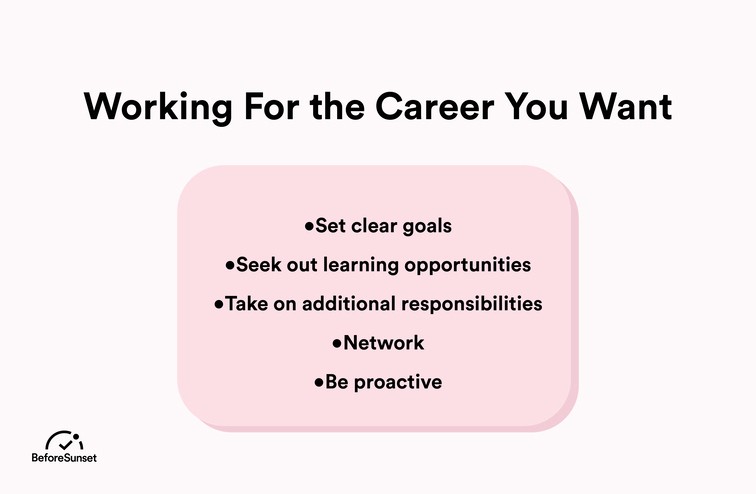
3. Working For the Career You Want
Working for the career you want means taking an active role in your own life and career development and putting in the extra effort to achieve your goals. It could involve doing more hours, taking on additional responsibilities, seeking out new learning opportunities, or finding ways to improve your skills and knowledge.
By working for the career you want, you demonstrate a strong sense of ambition and drive, and show that you are committed to your own professional development. It also helps you stand out and make a positive impact in your career:
Set clear goals:
Identify the specific career goals you want to achieve and create a plan to work towards them.
Seek out learning opportunities:
Look for ways to learn and grow, whether it's through formal education or on-the-job training.
Take on additional responsibilities:
Volunteer for new projects or tasks that will challenge you and help you develop new skills.
Network:
Build relationships with people in your industry and seek out mentors who can offer guidance and support.
Be proactive:
Don't wait for opportunities to come to you – create them for yourself.
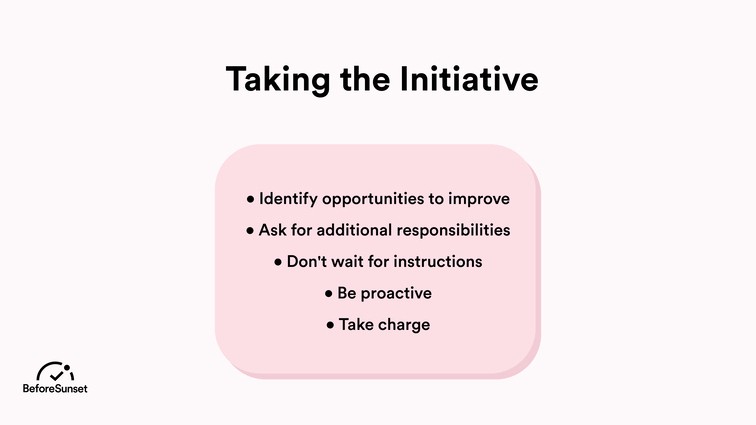
4. Taking the Initiative
Rather than simply waiting for instructions and directions, try to take initiative and stand out in the workplace. This way, you can demonstrate a strong sense of leadership, and a willingness to take on additional tasks and responsibilities:
Identify opportunities to improve:
Look for ways to improve processes or solve problems in your work.
Ask for additional responsibilities:
Don't be afraid to volunteer for new tasks or projects that will challenge you and help you develop new skills.
Don't wait for instructions:
If you see an opportunity to get started on a task or project, don't wait for someone to tell you to do it – take the initiative and get started.
Be proactive:
Rather than simply reacting to problems or issues, be proactive and anticipate potential problems or needs before they arise.
Take charge:
Don't be afraid to take charge of your work and take the lead on projects or tasks.
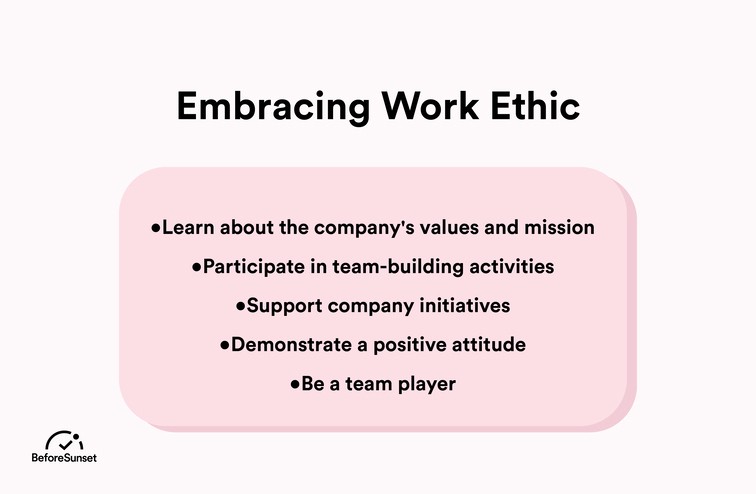
5. Embracing Work Ethic
Embracing the work culture of your organization means actively participating in and supporting the values, beliefs job expectations, and norms of your company. It could involve participating in team-building activities, supporting company initiatives, or simply demonstrating a positive attitude and a willingness to engage in work as part of a team.
It is key to standing out from your colleagues and competing in today's competitive job market and it most definitely takes effort to develop a work ethic, but the rewards are worth it:
Learn about the company's values and mission:
Understand the values and mission of your company and how they align with your own personal values.
Participate in team-building activities:
Take part in team-building activities and events to build relationships with your colleagues and support the culture of your organization.
Support company initiatives:
Show your support for company initiatives and projects, and be an active participant in driving them forward.
Demonstrate a positive attitude:
Show a positive attitude and a willingness to work as part of a team, even when faced with challenges or setbacks.
Be a team player:
Support your colleagues and work together as a team to achieve common goals.
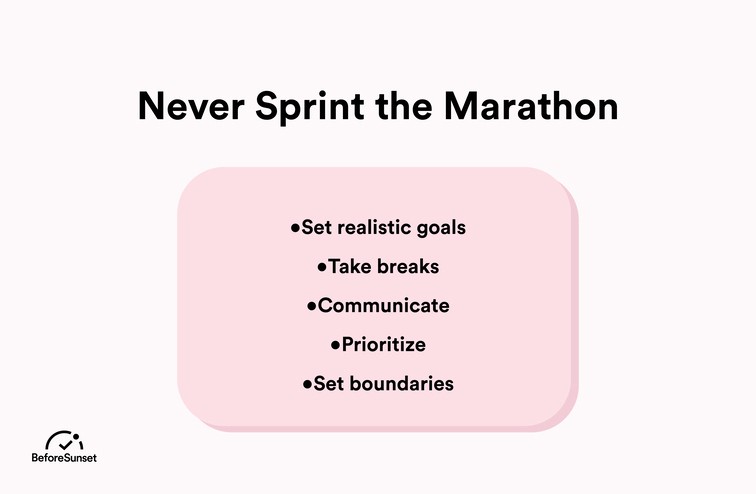
6. Never Sprint the Marathon
Never sprinting in a marathon refers to the importance of maintaining a sustainable pace and interest in your work, rather than burning out by trying to do too much too quickly. It means understanding that long-term success and successful career often requires a consistent and sustained effort, rather than short bursts of intense activity.
You demonstrate a strong sense of self-awareness and the ability to manage your own workload effectively by never sprinting the marathon. Here are some tips to how never get tired during this marathon:
Set realistic goals:
Don't try to take on too much at once – instead, set realistic goals and pace yourself to achieve them.
Take breaks:
It's important to take breaks and rest to prevent burnout and maintain your energy and focus.
Communicate:
Talk to your manager and colleagues about your workload and ask for support if you need it.
Prioritize:
Make a list of your tasks and prioritize the most important ones to ensure you are focusing on the things that will have the biggest impact.
Set boundaries:
Set boundaries around your work time to ensure you have time for other activities and commitments outside of work.
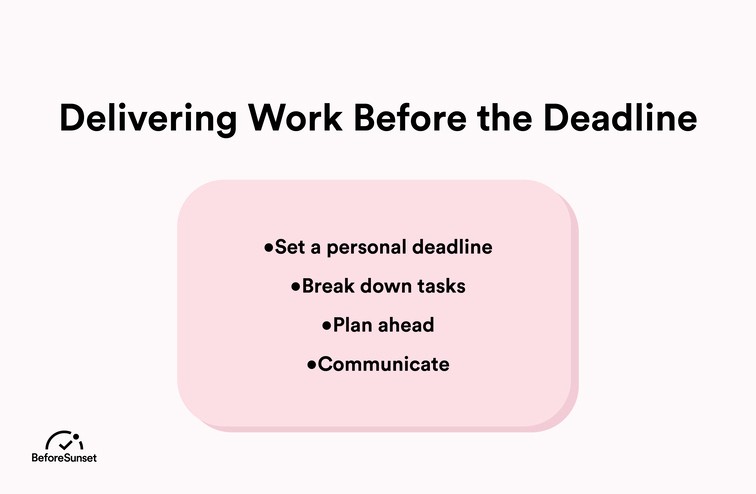
7. Delivering Work Before the Deadline
Delivering before the deadline means completing your work ahead of the agreed-upon timeframe. It demonstrates a strong sense of responsibility, commitment, and reliability, and can help you stand out in your future career.
It shows your managers and colleagues that you're a hard worker. It can both lead to better work quality because there is less room for error and more initiative and creativity.
You may demonstrate your commitment and time management skills to your supervisor and coworkers if they notice you always complete your work in good time. It's a great way to establish yourself as a trustworthy and credible professional, which can open doors to new chances and boost your career's trajectory:
Set a personal deadline:
Set your own personal deadline for completing your work, and aim to finish it ahead of the agreed-upon timeframe.
Break down tasks:
Break down large tasks into smaller, more manageable chunks to make it easier to stay on track and meet deadlines.
Plan ahead:
Plan your work in advance and consider potential obstacles or challenges that may arise.
Communicate:
Keep your boss and colleagues informed about your progress and let them know if you need additional support or resources to meet deadlines.
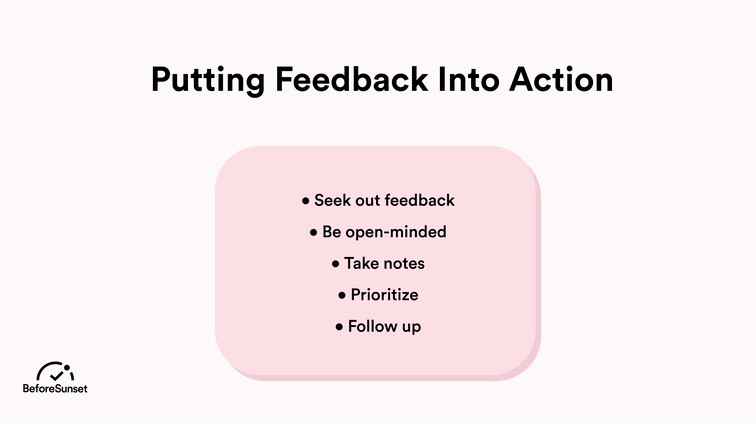
8. Putting Feedback Into Action
Putting feedback into action means actively seeking out and considering feedback from your boss and colleagues, and using it to improve your work. It demonstrates a strong willingness to learn and grow, and a commitment to continuous improvement:
Seek out feedback:
Don't be afraid to ask for feedback from your boss and colleagues. It's a valuable opportunity to learn and grow.
Be open-minded:
Be open to hearing feedback, even if it's critical. Don't take it personally – instead, consider it as an opportunity to improve.
Take notes:
Write down the feedback you receive and keep a record of it. This will help you remember the specific points and make it easier to implement changes.
Prioritize:
Consider which pieces of feedback are most important and focus on implementing those first.
After you have implemented changes based on feedback, follow up with your boss or colleagues to let them know what you have done and ask for additional feedback.
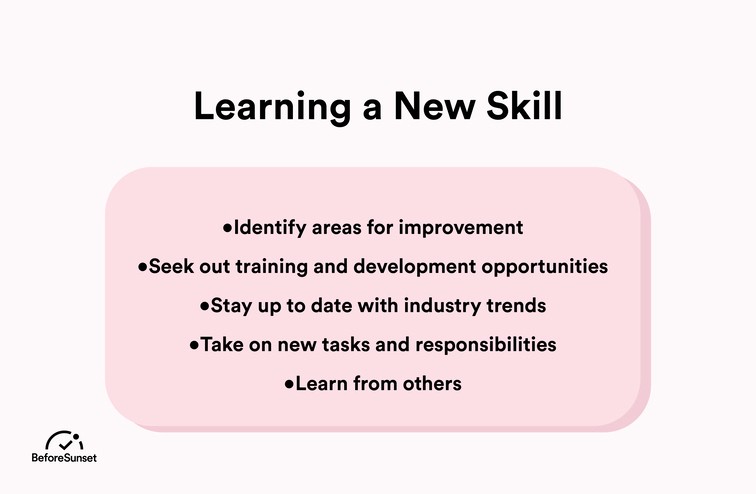
9. Learning a New Skill
Learning a new skill in the workplace can mean taking on new tasks certain jobs or responsibilities, seeking out training or development opportunities, or simply staying up to date with industry trends or best management practices:
Identify areas for improvement:
Consider what skills you would like to improve or develop, and look for opportunities to learn them.
Seek out training and development opportunities:
Look for training programs, workshops, or other development opportunities that can help you learn new skills.
Stay up to date with industry trends:
Read industry publications, attend conferences or events, and stay current with best practices in your field.
Take on new tasks and responsibilities:
Volunteer for new tasks or projects that will challenge you and help you develop new skills.
Learn from others:
Seek out mentors or colleagues who can offer guidance and support as you learn new skills.
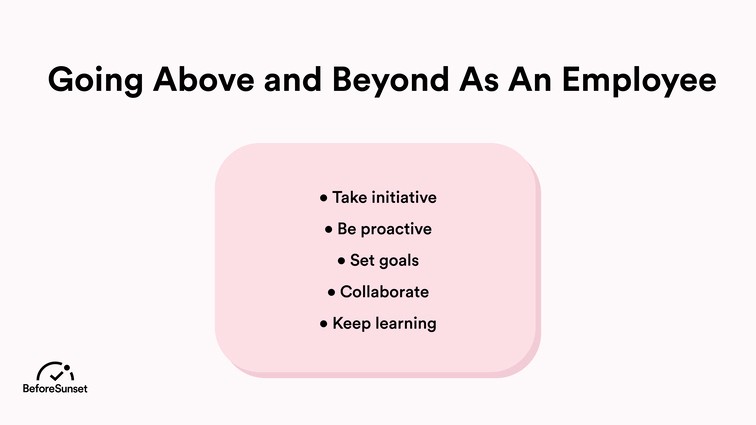
Going Above and Beyond As An Employee
There are several benefits to going the extra mile at work:
Increased job satisfaction:
By going the extra mile, you can feel more fulfilled and satisfied in your job, knowing that you are making a positive contribution and going above and beyond in your work.
Improved performance:
By putting in extra effort and going above and beyond, you can improve your performance and stand out to your boss and colleagues. This can lead to more opportunities and advancement in your career.
Stronger relationships:
By demonstrating a willingness to help others and go the extra mile, you can build stronger relationships with your colleagues and create a more positive and supportive work environment.
Increased job security:
By consistently delivering high-quality work and going the extra mile, you can increase your job security and demonstrate your value to your company.
Improved skills and knowledge:
By taking on additional tasks and responsibilities or seeking out learning and development opportunities, you can improve your skills and knowledge, making you more competitive in your field.
Overall, going the extra mile at work can have a number of benefits for you as an employee.
So, if you want to stand out, make a positive impact, and improve your career prospects, consider incorporating this skill into your work. So, if you want to improve your career prospects, consider incorporating this skill into your work.

What Motivates You Most to Go Above and Beyond at Work?
Personal satisfaction, the desire for excellence and pride in one's work, the possibility of career advancement, recognition and appreciation from coworkers and superiors, a sense of purpose, and a dedication to the organization's goals and values are some things that inspire people to go above and beyond at work.
The difficulty of assuming additional obligations and learning new abilities can also serve as motivation for certain people to succeed. In the end, each person's motivations for going above and beyond at work may differ and depend on their own personal and professional objectives, beliefs, and interests.
What are Examples of Going Above and Beyond at Work?
Going above and beyond at work means demonstrating a high level of commitment and dedication to your job beyond what is expected of you. Some examples of going above and beyond at work include taking on additional tasks or responsibilities that are not part of your usual job description, volunteering for extra assignments, or staying late to complete a project or task.
It can also mean proactively seeking out ways to improve your performance or the performance of your team by suggesting new ideas or strategies. Going above and beyond at work can lead to increased productivity, improved job satisfaction, and potentially even promotions or recognition for your hard work and dedication.
Is It Always Good to Go The Extra Mile?
As we've just explained, going the extra mile at work can be a great way to stand out, show your dedication to your job, and make a positive impact on your team and company. However, it's important for employees to be aware of the potential risks of going the extra mile, as it can sometimes be a double-edged sword. Do you know how you can go above and beyond and not burnout? By using BeforeSunset AI! BeforeSunset AI is your aide in completing your task list. It plans your day for you using its AI function and it does it all for free. You can sign up right now and see your productivity increase!
Here is what might happen If try to do it without the help of BeforeSunset AI:
Burnout
One risk of going the extra mile at work is the risk of burnout. When you consistently put in extra effort and take on additional tasks and responsibilities, it can be easy to become overwhelmed and burnt out. To prevent burnout, it's important to set boundaries, take breaks, and prioritize self-care.
Lack of Recognition
Another potential risk of going the extra mile is that you may not always be recognized or appreciated for your efforts. While it's important to do your best work regardless of whether or not you receive recognition, it can be disappointing if you feel like you are putting in extra effort and not receiving the recognition you deserve.
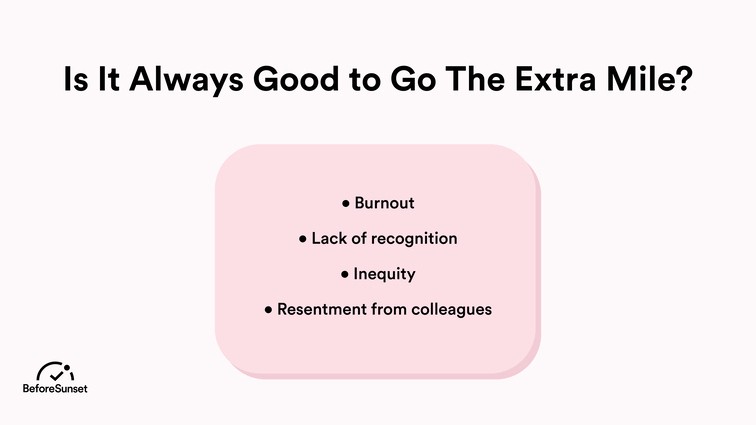
Inequity
Going the extra mile can also sometimes create inequity in the workplace. For example, if you are consistently putting in extra effort and taking on additional tasks, you may feel like you are not being fairly compensated or that you are being asked to do more than your fair share. It's important to communicate with your boss and colleagues about your workload and ensure that you are being fairly compensated for your efforts.
Resentment From Colleagues
Finally, going the extra mile at work can sometimes lead to resentment from your colleagues. If you are consistently taking on additional tasks or responsibilities, others may feel like you are taking on more than your fair share, or that you are trying to "show off" or impress your boss. It's of course important to be aware of this potential risk and to communicate openly and honestly with your colleagues to avoid any negative feelings.
Should You Go Above and Beyond at Work?
Aside from career advancement, job satisfaction, and praise from coworkers and superiors, going above and beyond at work has numerous advantages. In order to avoid burnout or neglecting other obligations, it's crucial to strike a balance in your efforts.
To prevent overworking yourself, it's critical to prioritize your tasks, establish attainable goals, and manage your time well. Also, you should speak with your boss to ensure that your efforts correspond with the organization's goals and expectations.
In conclusion, going above and beyond at work can be advantageous, but it's critical to maintain a healthy work-life balance and make sure your efforts are sustainable over time.
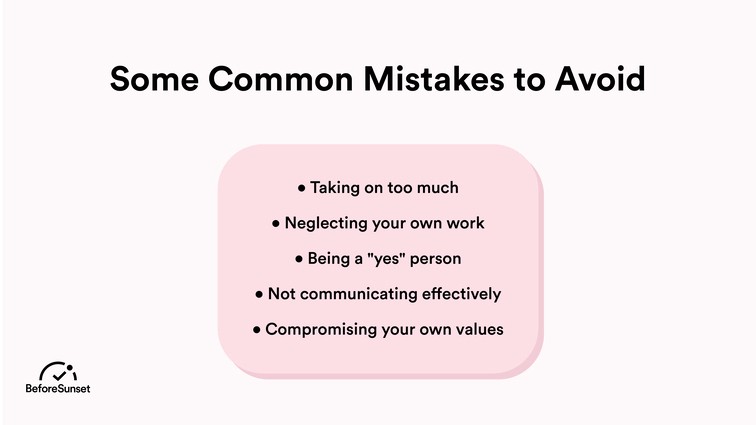
Some Common Mistakes to Avoid to Embrace Success
It's important to avoid making common mistakes when going the extra mile, as it can sometimes backfire and have negative consequences. Here are a few common mistakes to avoid
Taking on Too Much
One common mistake when going the extra mile at work is taking on too much. It's important to be proactive and willing to take on additional tasks and responsibilities, but it's also important to set boundaries and ensure that you are not overwhelmed. You want to improve efficiency not the opposite.
Neglecting Your Own Work
Another common mistake is neglecting your own work while trying to go the extra mile. While it's important to help out your colleagues and team, it's also important to prioritize your own work and ensure that you are meeting your own deadlines and responsibilities. Don't forget to do your job requirements and do these extra tasks on your free time.
Being a "Yes" Person
It's important to be willing to help out and support your team, but it's also important to be honest and realistic about what you can and cannot do. Saying "yes" to everything can lead to burnout and may not be sustainable in the long run. Actively listen to advice but don't say yes to everything.
Not Communicating Effectively
It's important to communicate with your boss and colleagues about your workload and any additional tasks or responsibilities you are taking on. Not communicating effectively can lead to misunderstandings or confusion, and may not result in the recognition you deserve.
Compromising Your Own Values
Finally, it's important to be true to your own values and beliefs when going the extra mile. Don't compromise your own values or beliefs in. Have an action plan in mind and try not to compromise.
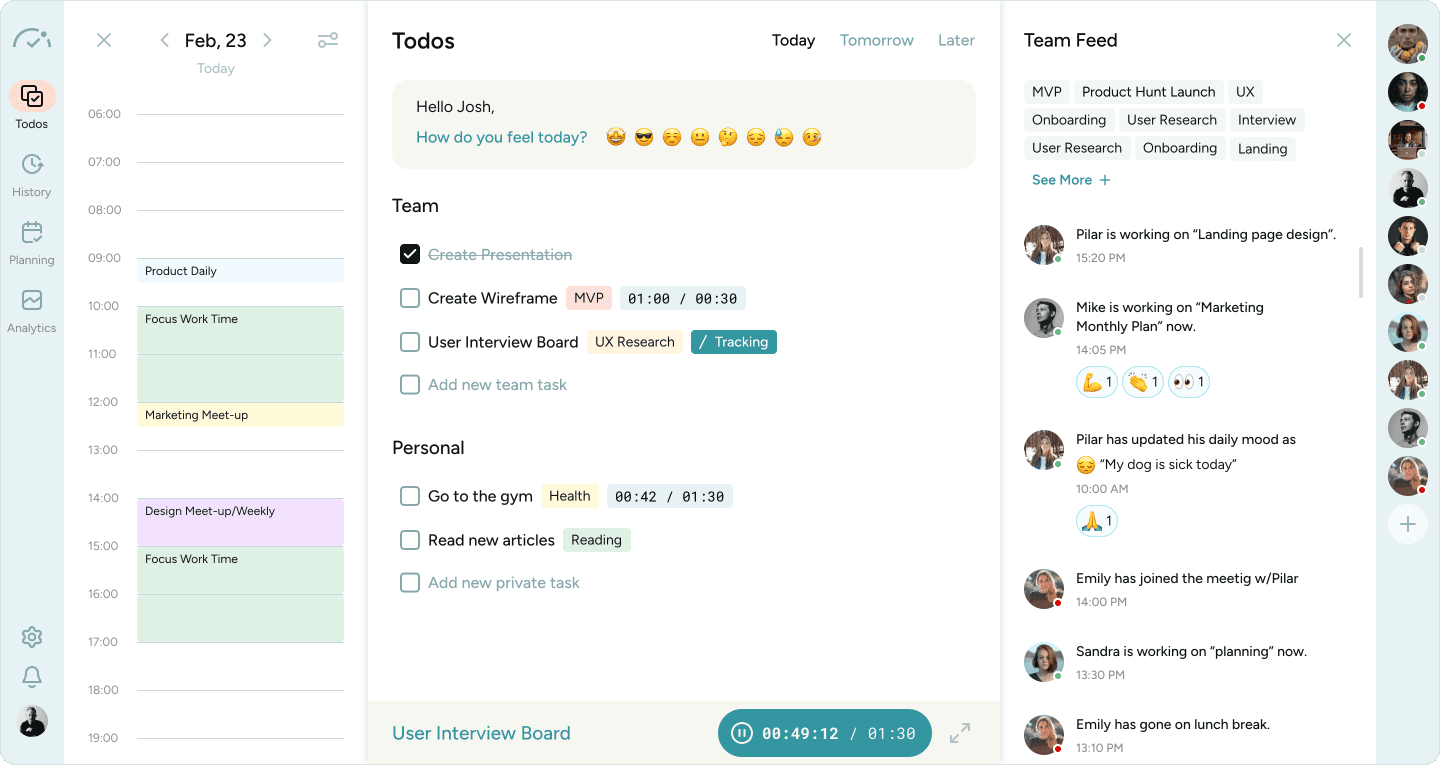
Enhancing Professional Communication with Diverse Vocabulary
In the professional world, clear and varied communication is key to effective interactions and successful projects. Here are some useful synonyms and expressions that can enrich your workplace communication:
Ghost: In a business context, "ghost" can refer to something that is elusive or unclear. Synonyms like phantom or specter can describe abstract challenges or hidden issues within projects, adding nuance to discussions.
Visual Range: This term can describe the scope of a project or the breadth of a team’s responsibilities. Synonyms such as field of vision or line of sight can clarify discussions about the extent of one's duties or oversight.
Extra Time: Common in project management, terms like additional time, extended period, or overtime are crucial when discussing project timelines and deadlines. Using these terms can help in negotiations and planning to ensure clarity on scheduling needs.
Period of Time: Describing timelines can benefit from terms like interval, duration, or timeframe. These words help specify the length and nature of project phases, making it easier to plan and communicate milestones.
Willow Patch: While more poetic, this term can metaphorically describe a calm, productive space or a niche market area within a project or business strategy. It can symbolize a focused and serene work environment or a specific segment of a market.
Black List: In a professional setting, a blacklist might refer to a list of banned items, practices, or undesirable behaviors. Synonyms like blocklist or exclusion list can be used in cybersecurity, compliance, or management contexts.
Mile-Long Mass: This phrase can describe extensive workloads or large-scale projects. It emphasizes the size and scope, often used to illustrate the magnitude of a challenge or task at hand.
Dizziest Ambition: High aspirations are common in the business world. Phrases like lofty goals or bold objectives can be used to inspire teams or describe strategic aims. These terms encourage ambition while setting a vision for success.
Project Management Tool: Essential in organizing work, a project management tool, also known as a project planner or workflow software, is crucial for tracking tasks, deadlines, and resources. These tools help streamline operations and improve efficiency.
Applying Vocabulary in Professional Settings
Expanding your vocabulary enhances your ability to articulate ideas and solutions in the workplace. Whether you're drafting emails, delivering presentations, or engaging in team meetings, using precise and varied language can lead to clearer communication, better understanding, and more effective collaboration. By incorporating these terms into your daily communication, you can elevate your professional interactions and contribute to a more dynamic and engaging work environment.
Looking For More Ways to Get More Actionable Insights
In conclusion, the idea and practice of going the extra mile can be a great way to stand out, show your dedication to your job, and make a positive impact on your team and company. By using synonyms like "anticipating needs," "going out of your way," "working for the career you want," "taking the initiative," and "embracing the work culture," you can effectively demonstrate your commitment to going above and beyond in your work.
However, it's important to be mindful of the potential risks of going the extra mile and to avoid common mistakes like taking on too much, neglecting your own work, being a "yes" person, not communicating effectively, and compromising your own values.
If you want to effectively go the extra mile, consider signing up for a productivity tool to help you stay organized, prioritize your tasks, and communicate effectively with your team.
You can download our e-book by clicking the cover image.
Conquering Beyond Your Limits: BeforeSunset AI
By using BeforeSunset AI, you can improve your productivity and efficiency, and better demonstrate your commitment to going above and beyond in your work. So, don't wait – sign up for this productivity tool today and start going the extra mile!
Strongest Matches:
Schedule Time: BeforeSunset AI excels at helping you schedule tasks and create a structured daily plan.
Daily Tasks: BeforeSunset AI assists in managing your daily to-do list, prioritizing tasks, and ensuring you achieve your goals.
Time Management Method: BeforeSunset AI offers various time management techniques within its framework, like time-blocking and the Pomodoro Technique.
Daily Goals: BeforeSunset AI empowers you to set daily goals and track your progress towards them, keeping you focused and motivated.
Positive Experience: BeforeSunset AI aims to create a positive experience by providing a user-friendly interface, helpful reminders, and a sense of accomplishment as you complete tasks.



